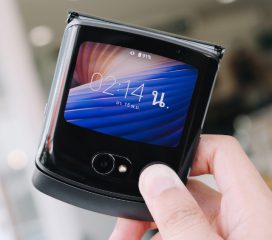

Operators are now in an abusive relationship with Apple says Simon Rockman
When Lenovo launched the Motorola Razr 5G it was eSIM only. And no one noticed. Apple launched the iPhone 14 (essentially an iPhone 13 with ’14’ on the box) and it was hailed as a great innovation because it was eSIM only.
Perhaps there is merit in this reaction. But it is merit which comes down to evil intent. For, since the original iPhone was launched in January 2007 Apple has been sucking all the revenue out of the mobile ecosystem.
Operators are so scared of losing the iPhone that they practically beg Apple for the chance to sell them. Go to the home page of any of the UK operators and the first phone you’ll be offered is an Apple iPhone. On one side, even if you type “Samsung” into the search box you get an option which says “Samsung AND Apple”.

Secrets
This isn’t because the operators want you to buy Apple over Samsung, Xiaomi or Oppo. It’s because Apple insists upon it under their terms of business. Many of these terms are shrouded in secrecy. Individuals within the organisation are bound by NDAs not to breathe a word. Colleagues are even forbidden from talking to each other about what has been agreed with Apple.
Ofcom reckons the average mobile phone bill is £14 a month. The UK population is around 67 million and there is an average of 1.2 subscriptions per person. This equates to £13.5bn revenue coming into the mobile industry in the UK alone.
Yet in the past couple of decades running a mobile network has gone from being fabulously lucrative to having incredibly -tight margins. During this time Apple has become a trillion-dollar company with margins most businesses can only dream of (as anyone who has ordered a base iPhone or Mac with extra SSD storage will tell you …Ed).
Standards
The mobile industry is built on standards. One of these standards is IR21 which allows devices to know what features a particular mobile network has. IR21 applies from 2G to 5G to any mobile operating system and IoT device. Except for Apple. For an iPhone to recognise your network supports 5G (or whatever) it needs an Operator Profile. All an operator has to do to get a profile is buy $12m of phones from Apple. This is how Apple locks users into its ecosystem from iMessage to FaceTime to the lightning connector
A sim-less phone isn’t new. In the 2G days, we had GSM in Europe and CDMA in the US. CDMA phones didn’t have SIMs. The operator had control of the phone. Apple has inverted the eSIM model to take device control from the operator and consumer.
Operators are now in an abusive relationship with Apple. The eSIM-only iPhone14 is the trigger by which it’s about to get worse. It will allow Apple to disintermediate the operator in a way that the traditional sim has prevented. Physical Sims provide the user with choice and give operators a direct relationship with their consumers.
In Apple’s eSIM-only world, consumers will buy their eSIM from the Apple app store. Apple will expect operators to compete for a position in the store and Apple will take a revenue share on the sale of the sim as well as a share of the call revenue. Consumers will be encouraged to churn and hop from operator to operator, perhaps even on a call-by-call basis as a way of having better coverage.
Again this is not an Apple-originated innovation. Google does it in the USA with its Google Fi service. It works very well providing much better coverage than a single operator can. The difference is that Google does it without bullying tactics. Connectivity is at the heart of the mobile telecoms industry When Apple presents its connectivity service it will turn connectivity into just another app and it will give Apple the power to make or break an operator. The eSIM will become how Apple can switch iPhone owners to its favoured operator. iPhone 14 is a great innovation.
Just remember – Timeo Danaos et dona ferentes.
“I fear the Greeks even when bearing gifts”.

Simon Rockman worked for Motorola during the development of the original Razr. Today he is the Chief of Staff at Telet, which builds private 5G networks.






